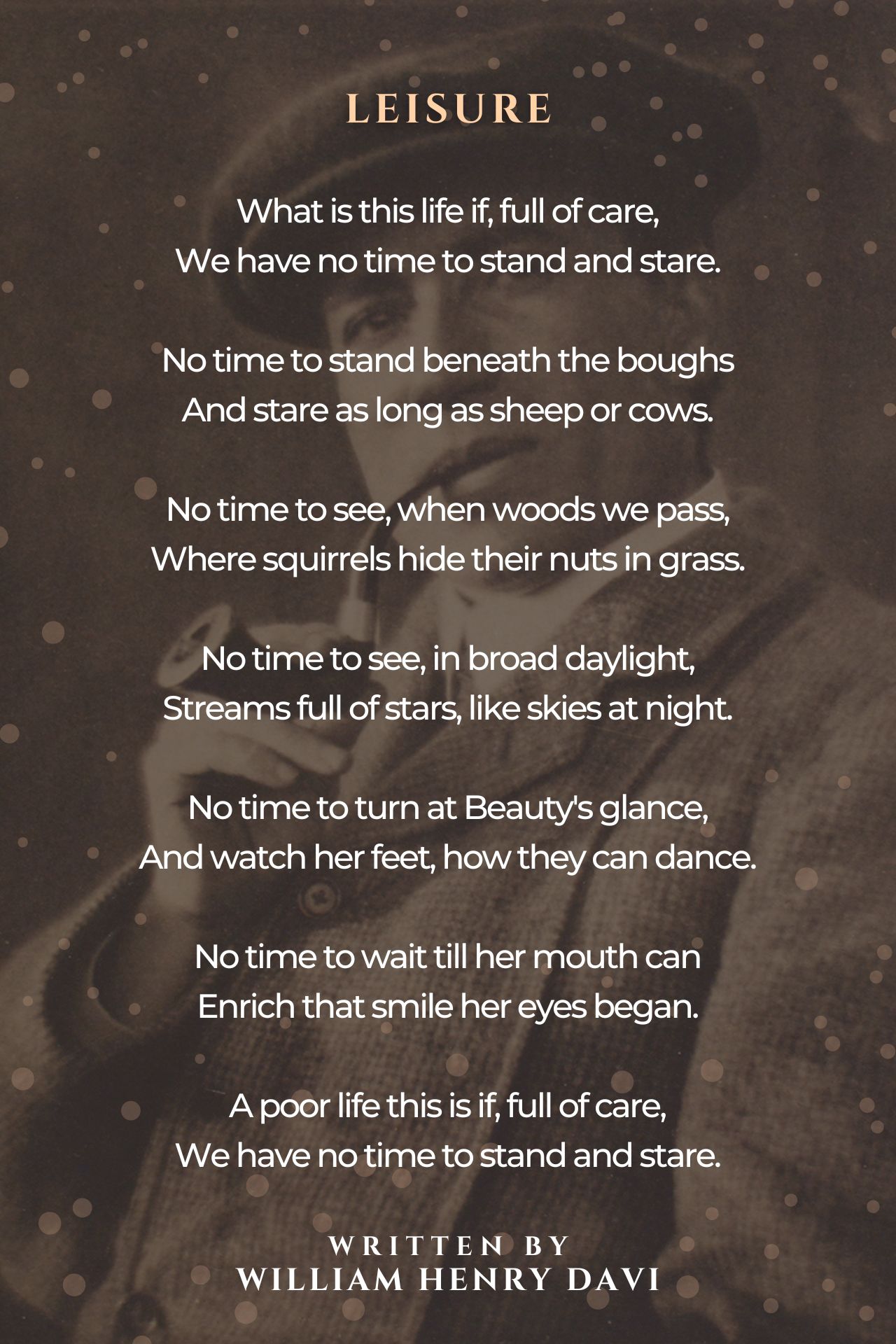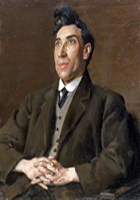Leisure Poem by William Henry Davies
Leisure
What is this life if, full of care,
We have no time to stand and stare.
No time to stand beneath the boughs
And stare as long as sheep or cows.
No time to see, when woods we pass,
Where squirrels hide their nuts in grass.
No time to see, in broad daylight,
Streams full of stars, like skies at night.
No time to turn at Beauty's glance,
And watch her feet, how they can dance.
No time to wait till her mouth can
Enrich that smile her eyes began.
A poor life this is if, full of care,
We have no time to stand and stare.

I read the poem 'Leisure' by William Henry Davies many years ago at school. Only now with the internet it is possible to find out extra facts about the writer. WHD had a hard time as a poet but many in the Theatre supported him. He self published a book of poems and earned some money from the sales. He covered the many miles of road making observations and writing his poetry. An amazing person. Loved his poem 'Leisure' by the way.
In “Leisure”, W.H. Davies explores the importance of leisure of everyday life. The speaker begins by asking a rhetorical question, “What is {this} life? ” This begins a continuous, slow, and harmonious rhythm Davies emphasizes the fact that you need to disregard the things that aren’t truly important and to pace yourself. Furthermore, Davies gives details of having time by comparing us busy humans to “Sheep or cows” that leisurely spend their time. In the fourth couplet, he says that there are streams full of stars, yet people are so busy, that we are “blind in the day”. We are so busy, that we may miss vital and important information in life. The author concludes his poem by answering his earlier question, “A poor life this, ” if full of care, there is no time to stand and stare.Henceforth, people need leisure to experience the benefits of nature and the bliss of being alive.
What a shame many don’t have time to notice this worlds beauty and splendor. This is true now more than ever. We can’t admire trees, forests, nor the stars at night. This poem is written in iambic tetrameter which flows nicely!
, ; , , , /.bvytgktfulyhn; jikkoplhb jhk, kukik, bhjkhuikllkgmno8iljkulop; ,
is this crap? there are like 5 ads in the video u creators greedy bastards

• ‘Leisure’ is a simple yet beautiful and thought provoking poem written by William Henry Davies (W. H. Davies) . In this poem, the poet wonders whether it is worth leading a life which provides one with no time for leisure. • • The poem ‘Leisure’ is divided into seven rhyming couplets. • • Couplet 1: • • The poet, W. H. Davies, begins by questioning the purpose of a life which is so full of worry that it does not allow us any time to simply stand still and watch the world go by. • • In the next few couplets, he describes the various things that people are not able to do due to lack of leisure. • • Couplet 2: • • Sheep and cows can often be seen standing still in vast open fields and staring into a distance. People living a busy life would not posses the leisure to stand under the branches of trees and keep gazing on and on like such ruminants. • • Couplet 3: • • W. H. Davies further adds that when such people pass a forest or a woodland, they would be in too much of a hurry to notice the nooks and crannies in the grass where squirrels conceal their nuts. They would not posses the leisure to notice the various aspects of the natural world around them. • • Couplet 4: • • In daylight, streams appear to be sparkling under the effect of sunshine making it seem as if the streams are full of stars like the night sky. However, such beauties of nature are likely to be missed by people overburdened by anxiety and living a life of haste without any leisure, remarks W.H. Davies. • • Couplets 5 and 6: • • There are two ways of looking at the fifth and sixth couplets of the poem: literally and metaphorically. • • Looking at it literally- The poet states that the rush of life provides people with no leisure to turn at the glance of a beautiful maiden and marvel at her dancing feet. • • They are unable to leisurely observe her as her mouth shapes out a smile that started from her eyes. • • Looking at it metaphorically- W.H. Davies has personified the beauty of the world around us which many often fail to observe due to a lack of leisure. The dancing feet and enchanting smile refers to various aspects of the beauty around us. • • Couplet 7: • • In the final couplet of the poem, Davies states that a life which is so bogged down by worry that it allows one no time for leisure is indeed a miserable life. If you read the first couplet of ‘Leisure’ carefully, you will notice that although it ends with a full stop, (and is hence in the form of a statement) it can also be interpreted as a question asked by the poet. In that case, the final couplet can be seen as W. H. Davies’ answer to his own question.
thank u thank u thank u.... so so so so soooooooo much....... :)